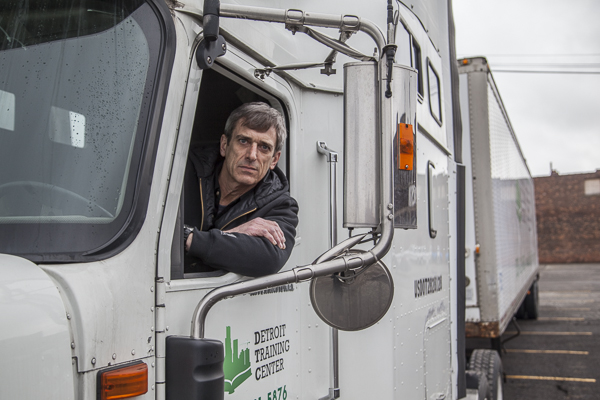How a startup training center is rebuilding Detroit's workforce
Matthew Lewis |
Sunday, March 20, 2016
When Atlanta native Marcus Jones enrolled in graduate school at the University of Michigan in 2009, the country was in the depths of the worst recession since the Great Depression. Detroit was particularly hard hit, with an unemployment rate that eventually exceeded 28 percent. While solving Detroit's workforce dilemma wasn't at the top of Jones's mind, the experiences he had in the city of Detroit while pursuing a dual master's in urban planning and environmental policy would set him on a path to help do just that.
"A lot of my master's work was focused on Detroit," says Jones, now 29. "Being a planner, I was interested in the triple bottom line – creating jobs, making communities better, and removing toxins." One of his big projects was working with a team to develop a toolkit that the city could use to address blight, a sort of precursor to the Motor City Mapping project.
 Marcus Jones, director of the Detroit Training CenterAfter graduating, Jones took what he thought was his dream job at the U.S. Green Building Council. After eight months in Chicago, however, Jones felt the itch to return to Detroit "to be part of something bigger." Around that time, he met people in construction who were struggling to find contractors trained in asbestos removal -- that's when the proverbial lightbulb turned on.
"We figured we could train people from the city to do blight removal in the city," he says.
As the economies of southeast Michigan and the nation rebounded from the recession, a skills match problem was emerging in Detroit. The city's greater downtown was beginning to boom with development, but many Detroiters, lacking the skills necessary to take on new jobs being created, were left out of the picture. (Detroit's unemployment rate is currently 10.2 percent, more than double that of the nation.) Similarly, many Detroiters weren't qualified for jobs resulting from millions of dollars being invested in blight remediation efforts in the city's neighborhoods.
It was in this context that Jones and his partners launched the Detroit Training Center in 2012. They rented a small conference room in a downtown building where they would host one class per month, training 15 students at a time in asbestos removal. At the end of each week-long class, students would receive state certification, making them eligible for jobs.
"As we grew, we took our classes to places like Focus:HOPE," says Jones. "They let us share space with WARM Training Center (now Eco Works). We started getting into OSHA safety, first aid and CPR, lead training, and heavy equipment training. We wanted to create a holistic blight removal program."
As DTC added classes, it quickly outgrew its shared space. Their search for a new home led them to Loraine Street at Grand River Avenue, where the Alta Equipment Company, a New Hudson-based heavy equipment rental and repair business, had just purchased an 80,000-square-foot facility.
"We're a one-stop shop for equipment," says Jordan Klein, Alta's rental coordinator in Detroit. "You give us a need and we'll sort you out within 24-48 hours. Anyone using heavy equipment in the city of Detroit is coming here."
Marcus Jones, director of the Detroit Training CenterAfter graduating, Jones took what he thought was his dream job at the U.S. Green Building Council. After eight months in Chicago, however, Jones felt the itch to return to Detroit "to be part of something bigger." Around that time, he met people in construction who were struggling to find contractors trained in asbestos removal -- that's when the proverbial lightbulb turned on.
"We figured we could train people from the city to do blight removal in the city," he says.
As the economies of southeast Michigan and the nation rebounded from the recession, a skills match problem was emerging in Detroit. The city's greater downtown was beginning to boom with development, but many Detroiters, lacking the skills necessary to take on new jobs being created, were left out of the picture. (Detroit's unemployment rate is currently 10.2 percent, more than double that of the nation.) Similarly, many Detroiters weren't qualified for jobs resulting from millions of dollars being invested in blight remediation efforts in the city's neighborhoods.
It was in this context that Jones and his partners launched the Detroit Training Center in 2012. They rented a small conference room in a downtown building where they would host one class per month, training 15 students at a time in asbestos removal. At the end of each week-long class, students would receive state certification, making them eligible for jobs.
"As we grew, we took our classes to places like Focus:HOPE," says Jones. "They let us share space with WARM Training Center (now Eco Works). We started getting into OSHA safety, first aid and CPR, lead training, and heavy equipment training. We wanted to create a holistic blight removal program."
As DTC added classes, it quickly outgrew its shared space. Their search for a new home led them to Loraine Street at Grand River Avenue, where the Alta Equipment Company, a New Hudson-based heavy equipment rental and repair business, had just purchased an 80,000-square-foot facility.
"We're a one-stop shop for equipment," says Jordan Klein, Alta's rental coordinator in Detroit. "You give us a need and we'll sort you out within 24-48 hours. Anyone using heavy equipment in the city of Detroit is coming here."
 Alta Equipment's rental yard
Alta Equipment's rental yard
Almost as soon as Alta opened its Detroit location in August 2015 (the branch is still in soft-opening mode, with a grand opening scheduled for June), its leaders were approached by Jones and his partners. In November, DTC held a grand opening of its own in a 5,000-square-foot space it rents from Alta adjacent to that company's showroom, workshops, and heavy equipment yard.
Buildout of DTC's facility was largely paid for with a $100,000 grant from Motor City Match, an initiative of the mayor's office that awards a total of $500,000 every quarter to Detroit businesses and building owners with plans to grow in the city. The award helped DTC launch a diesel mechanic training program, as well as outfit its news space with classrooms, offices, a kitchen, and a computer lab for students.
Since buildout, Alta and DTC have enjoyed a symbiotic relationship.
"As they bring in students for operator training, we supply them with the equipment they need at a very discounted rate," says Terrie Webster, Alta's rental manager. "We use their rooms for when we host brush up trainings. We help each other out. It's two separate companies, but we work together as a cohesive group."
Getting Detroiters ready for work
At its home on Loraine Street, the DTC offers dozens of vocational training and certification programs – everything from heavy equipment operation to blight removal and deconstruction training – that are helping Detroiters overcome obstacles to employment. Classes last anywhere from a few days to a few weeks and cost anywhere from a few hundred to a few thousand dollars. Students who cannot afford tuition are eligible for state and city assistance programs offered through organizations like the Detroit Employment Solutions Corporation.
Since its founding, the Detroit Training Center has graduated over 1,500 students, ninety percent of whom, according to Jones, are Detroit residents. Jones says graduates find jobs paying anywhere between $12 and $40 an hour depending on the field.
One of DTC's newest offerings, its Commercial Driver's License, or CDL, certification program, offers a relatively quick path to a good salary. The 3-to-6-week program – one of the only of its kind located within the city of Detroit – costs $3,850, but the return on investment is great. According to Tom Mueller, CDL division manager at DTC, graduates of his program can earn as much as $48,000 a year out of the gate.
 Tom Mueller, director of Detroit Training Center's CDL program
Tom Mueller, director of Detroit Training Center's CDL program
"Once you have your CDL and keep a clean driving record, it really opens up doors for you," says Mueller.
And DTC helps students keep those doors open.
"We include soft skills training with every course – how to write a relevant resume, mock interviews – starting from the first class," says Nancy Kouyara, DTC's director of new initiatives. "We're measured on placement, so that's important to us. But it's more important that our students learn to keep a job."
DTC's soft skills program even includes financial literacy training. "We've had students go from not having anything to buying their own cars and houses," says Jones. "Our programs allow someone who knows nothing to get their feet in the door. These success stories are why our partners keep referring people to us."
"We're offering an alternative," says Jones. "Not everybody's college bound, so we're providing a path to living wages. With the knowledge you gain here, you can eventually start your own business."
Detroit resident Marvin James Senior is a DTC graduate who has successfully parlayed his training in blight removal into growing his home improvement business. "It made me more professional and showed me how to properly abate houses," he says. "Because I had the license, I could show it to clients."
Senior plans to enroll in more training programs at DTC and eventually get his builder's license.
"Not only will I be able to demolish a house, but I can build one too."
Support for this feature is provided in part by Motor City Match, a program that connects new and expanding businesses with Detroit’s quality real estate opportunities, providing them with funding and tools to fuel the city’s entrepreneurial revolution. Learn more at www.mortorcitymatch.com.
Matthew Lewis is Model D's managing editor. Follow him on Twitter @matthewjlew.
Photos by Marvin Shaouni.